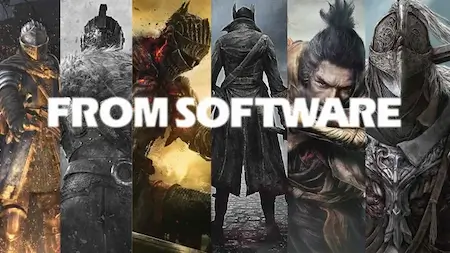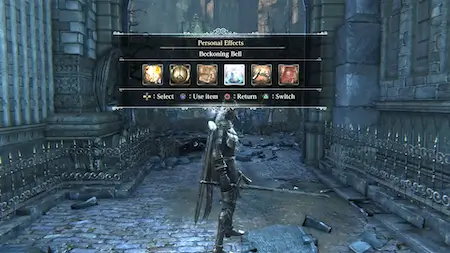Understanding Game Design and Challenge - I'm not the kind of player who longs for "the good old days" when games seemed to hate you and want you to die.
My attempt to replay Paperboy and recapture the glory of my NES days was short-lived as I realized how needlessly, unrewarding cruel that game is---I just didn't know any better as a kid.
TL;DR – Why Bloodborne Is Brutally Hard – And Incredibly Addicting
- Bloodborne is unforgiving by design, forcing players to learn through failure and experimentation.
- The aggressive combat system rewards confidence over caution, setting it apart from traditional Souls-like games.
- Its gothic horror aesthetic and cryptic lore create an immersive world that's both haunting and fascinating.
- The sense of accomplishment after defeating bosses is unmatched, making the struggle feel truly rewarding.
- Despite its difficulty, the tight mechanics and atmospheric world make Bloodborne endlessly addicting to master.
Bloodborne’s Challenge: The Nature of Difficulty in Gaming
But I'm also not the kind of player who wants games to be easy. My first walkthroughs are more often set to Hard than to Normal. My biggest disappointment about the death of my first PS3 Console was that I lost the save data for my finished Hard play through of The Last of Us and so wouldn't be able to play Survivor mode next.
The Table of Contents
The Allure of Tough Games
The difference is in what makes the game difficult. Difficulty, like everything else in a game, can be designed well or poorly. To see what good difficulty plays like, we need look no further than the PS4 exclusive Bloodborne, the latest offering from the sadistic team that brought us the Dark Souls games and, before that, the King’s Field games.
the PS4 exclusive Bloodborne, the latest offering from the sadistic team that brought us the Dark Souls games and, before that, the King’s Field games.
When I yell at the TV while playing Bloodborne, which happens quite a bit, my cat usually leaves the room.
Despite the yelling, I'm having a good time. At the same time, I've realized that Bloodborne isn't a game I can play while tired. I need to be alert and at my best to have any chance of survival.
While I don't see myself as an expert action-RPG player, I can do well in Bloodborne if I focus and learn from my mistakes.
“It is difficult, yes, but not insurmountably so; Bloodborne demands attention and patience, not superhuman skill.”
– Alex Wawro, Game Developer, The Usability of Bloodborne
Bloodborne: A Unique Gaming Experience
The Legacy of FromSoftware
- One thing Bloodborne does very well is make sure that any mistakes I make are my own fault. ---the game has a clear (electronic) manual and a decent system of unobtrusive in-game tutorial notes you can read if you choose.

- So when I fight poorly, it's because I still haven't learned the timing of my various attacks and dodges and how to deal with being staggered when an enemy's blow hits.
- I was surprised the first time I played. A battle can shift from being under control to ending suddenly because I get killed quickly.
- This quick change in pace, which is a hallmark of positive gameplay mechanics, keeps me engaged. As I have to keep learning and adjusting to how enemies act.
- Every loss teaches me something useful. It shows how the gameplay in Bloodborne helps me adjust my strategies and get better at the game.
Bloodborne's Distinctive Mechanics
- Bloodborne's design beautifully emphasizes accountability, making every mistake an opportunity for growth, which ultimately enhances the satisfaction of overcoming difficult foes.
- However, the balance of player skill vs design flaws also plays a crucial role in the experience.
- For example, if an enemy hits me hard and I don't dodge in time while I'm off balance, they will keep attacking until I lose. This dynamic is similar to what happens when I catch them by surprise or stagger them.
- I enjoy this game, but it highlights the careful balance between my skills as a player and the game’s design choices. Sometimes, it feels good to be stronger than my enemies. Other times, it's satisfying to know that my hard work and skills helped me win.
The game can change quickly, and a single mistake can lead to defeat, showcasing the ongoing clash of player skill vs design flaws in the heat of battle."
“Bloodborne demands aggression. The game rewards boldness and punishes hesitation.”
– Kirk Hamilton, Kotaku, Strategies For Playing Bloodborne
The Learning Curve: Embracing Failure
Why Mistakes Lead to Improvement
- The game teaches you these skills well. The game begins with easier enemies. As you progress, the difficulty increases, especially when you find the right path. You also come across tough enemies early that quickly inform you that you are not ready for them by dispatching you with ease.

- So Bloodborne is also a game where I know the level layouts particularly well. I know where I can go and do alright, where the new tough fights are, and where I need to stay away until I'm stronger and/or more skilled.
- This knowledge not only makes the bloodborne gameplay better but also helps me think more strategically. I learn to be careful in each encounter.
- Implementing effective Bloodborne strategies boosts my confidence when I go back to tough areas. I know I can use what I've learned to get past the challenges.
- Ultimately, this mastery of the layout makes every victory feel even more rewarding, reinforcing the idea that perseverance leads to success in Bloodborne.
Mastering Timing and Combat Mechanics
- I'm the kind of gamer who sometimes saves a lot to avoid replaying sections of a game. Bloodborne has shown me the pleasure of winning by doing everything correctly in one go.
- It takes away the option to reload the game after each mistake, which makes each victory feel more rewarding. You cannot just fix one thing, save, and then fix another. You have to succeed all at once. I feel like a better gamer playing Bloodborne.
- Game designer Hidetaka Miyazaki said, "The challenge is the reward." This idea clearly shows how Bloodborne's mechanics make players truly engage with the game's world. This careful way of playing helps me stay focused. I need to be alert and fully engaged in every battle.
- Timing becomes crucial, and every dodged attack or perfectly executed counter adds to the thrill of combat. As I practice more and pay close attention, I start to understand how enemies act. This makes each time I succeed feel even better.
- Many players share their tips and experiences on sites like Reddit or Bloodborne community thread. Which helps create a strong base of player knowledge about the game. Using these platforms can improve your gameplay, providing valuable Bloodborne tips that enhance the experience.
Checkpoints and Progression: Earning Your Way
The Importance of Checkpoints in Bloodborne
- Bloodborne uses simple mechanics. To give another example, there's no pause feature. None at all. You cannot pause Bloodborne.

- If your controller runs out of battery charge, you will watch as your character dies a mercifully quick and brutal death. If you need to get into your Inventory, you'd better find someplace to be alone.
- So you'd better have all the items and weapons you expect to need in your handful of quick select slots. The utter lack of pause is surprisingly fun.
- This constant focus keeps players attentive because even a small distraction can lead to big problems. It creates a unique feel in the game, where every move is important.
- By removing the ability to pause, Bloodborne raises the tension and urgency in every battle. This choice helps make the game more immersive, something players really enjoy.
The Challenge of Continuous Play
- It does not allow you to pause and think about the situation. You need to check out the area before starting the fight or stay alert to what is happening around you while you are fighting. Ideally, you should do both. It's always both in Bloodborne.
- Unless you are a much better player, you need a plan and to pay attention to your surroundings during a fight to stay alive. This design choice heightens the immersion and intensity of each encounter, making players feel truly present in the moment.
- As you improve at noticing enemy patterns and predicting their moves, dodging or countering them becomes more thrilling. In the end, the combination of excitement and adaptability is what makes tackling Bloodborne's challenges rewarding and engaging.
"Bloodborne gives you the sense that you are working hard to get through a world that does not care if you live or die. This creates a strong feeling."
– Jeff Gerstmann, Giant Bomb, Top 10 Games for PS4
Strategies for Managing Combat in Real-Time
- All this is true without the game giving me a map feature or a 'your goal' feature to lead me to the next boss or treasure. Not having a map, like not pausing the game, makes me improve on my own.
- I need to understand how the areas connect, just like my character does.I learn through the tough gameplay of Bloodborne rather than by looking at a map or knowing where a hidden enemy is waiting.
- It's fun and immersive. This design choice makes players feel like they are discovering new things in Bloodborne. Each area feels like a real world ready to be explored. It asks players to watch their surroundings and remember important places. This makes it more challenging and exciting to explore its risky areas.
- In the end, this absence of clear directions helps players feel more connected to Bloodborne. Every victory becomes more rewarding because of the effort it takes to achieve it.
Skill Development: Evolving as a Gamer
Familiarity with Level Layouts
- In Bloodborne, knowing the level layouts is important for getting around its tough world. Each intricately designed area encourages players to explore and strategize rather than rush blindly into combat.

- As you explore the streets of Yharnam, you will find shortcuts, ambush areas, and hidden treasures. These discoveries can greatly change how you play the game.
- This need for familiarity helps me feel more involved in the game. I start to recognize important locations and remember the paths to safe areas or respawn points.
- Rather than relying on mindless mechanics, Bloodborne respects your intelligence and pushes you to think critically about your movements. This design creates a feeling of success, making each win against tough enemies a rewarding experience.
- In the end, learning the layouts of Bloodborne helps players face its tough challenges. It also shows that success can come from using skill and having a good strategy.
- The game shows how challenges can be rewarding when players take them on with purpose. It helps players grow and change as they work through its details.
The Value of Tactical Planning and Awareness
- In Bloodborne, you need to plan your moves and stay aware of your surroundings to get through its tough world. Each encounter teaches players to think strategically.
- Players need to pay attention to enemy patterns and make good use of their surroundings. For example, leading foes into tight corners or using elevation can be the difference between life and death.
- Awareness goes beyond fighting. It includes noticing possible dangers and knowing when to be aggressive or when to back off. Being aware is important, especially when facing strong enemies. A small mistake can lead to big problems.
- By learning tactical planning, I gain a better understanding of the skills needed to succeed in Bloodborne. The challenges I face help me grow and evolve as a player. In the end, Bloodborne shows that a tough game can be rewarding if you have the right attitude. It proves that you can succeed by using skill and planning.
The Fun in Fair Challenge
Balancing Difficulty with Satisfaction
- Bloodborne, like the Souls games before it, is a love-it-or-hate-it prospect for most players due to its notorious difficulty. This challenge interests many people. It provides a special and fun experience that exceeds typical gaming expectations.

- The game's difficult mechanics challenge players to stay determined and think strategically. This often leads to a strong feeling of satisfaction when they succeed in difficult tasks.
- Victories in Bloodborne feel hard-earned, as players learn from their failures and refine their skills over time. Every loss is a chance to grow. It shows that success is possible with hard work.
- By finding the right mix of challenge and fun, players can enjoy a great adventure that makes their gaming experience better.
"It's not about creating challenges just for the sake of it. It's about helping you think about the choices you make. You will die in the game, and that is a part of the process. You learn from those deaths.”
– Hidetaka Miyazaki, The Guardian
What Makes Bloodborne Worth the Struggle?
- Bloodborne turns difficulty into a story about strength and success. The challenges in the game help players get better and improve their skills.
- Each level of difficulty is important. Every victory, particularly after multiple attempts, feels uniquely earned, fostering a profound sense of achievement.
- Players often think about what kinds of games they like. Do they enjoy overcoming hard challenges, or do they prefer easier games? This brings up talks about other tough games in the Souls genre, like Dark Souls and Sekiro: Shadows Die Twice. These games reward players who keep trying.
- What makes Bloodborne worth the challenge is that it invites players to see difficulty as part of the story. This involvement gives players a feeling of success and helps them connect more deeply with the game.
“Dark Souls turns failure into a curiosity, something to be investigated. Every death is a clue.”
– Jason Killingsworth, You Died: The Dark Souls Companion
Frequently Asked Questions and Difficulty of Bloodborne
Why is Bloodborne hard?
- Yes — Bloodborne is considered a hard game, even among fans of the action RPG genre. The difficulty level stems from its relentless pace and unforgiving design.
- The challenge comes from tough enemies, quick battles, and the lack of a pause option or access to your inventory during combat. Players must react quickly, memorize enemy patterns, and explore without a map — all of which heighten the challenge.
- However, the difficulty isn't unfair. With time and practice, players build the skills necessary to tackle difficult encounters. Each hard-won victory feels incredibly rewarding, making the experience all the more satisfying.
- If you grew up playing tough NES games like Mega Man 2 or Paperboy, the challenge may feel familiar. Like those classics, Bloodborne rewards persistence and mastery, making each hard-earned victory feel incredibly satisfying.
What is the Bloodborne PS4 Prelude?
- It’s the game’s opening section where players awaken in Yharnam and learn the basic mechanics.
Can Bloodborne PS4 Be Played on a PS5?
- Yes, it runs on PS5 via backward compatibility with faster load times.
The Wrap up about this Amazing Game!
In conclusion, Bloodborne transcends the realm of traditional gaming, offering players an emotionally charged journey filled with challenging experiences and a captivating narrative. As players improve their strategies in Bloodborne to defeat tough enemies, they are rewarded with a story that makes them feel more involved and connected to the eerie world of Yharnam.
story that makes them feel more involved and connected to the eerie world of Yharnam.
Good gameplay mechanics come together to create a unique learning environment. Each victory feels rewarding and adds to the overall story.
In the end, Bloodborne's challenging difficulty, along with its engaging gameplay, provides players with a mix of skill, strategy, and storytelling. It's not just hard; it's a journey to remember.
Sharing is Caring: Spread the Love for Gaming on Social Media!
Looking to trade in Bloodborne or other PS4 classics? The Old School Game Vault offers fast, fair pricing and an easy way to keep your collection evolving.








